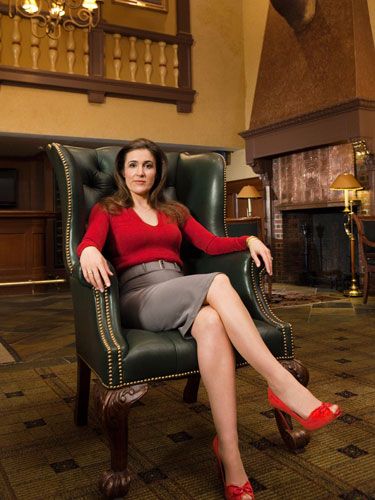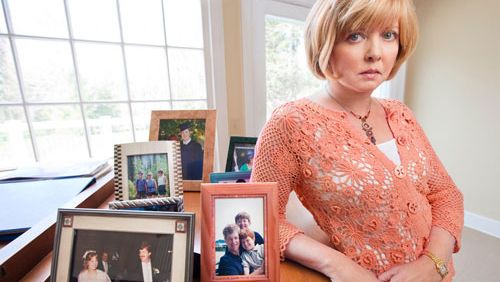When White-Collar Hubbies Go to Jail
What's it like when your high-rolling husband is imprisoned for fraud? Gretchen Voss learns the surprising details from three women who lived the headlines.

BERNADETTE NOE, 49
She fled to her winter retreat, a $5 million oceanfront mansion in Key Largo
IN THE SPRING OF 2005, Bernadette and Tom Noe convened an emergency family meeting at their daughter's Toledo, OH, home to break some grim news to their kids: The Feds were investigating Tom, a rare coin and collectibles dealer, for campaign-finance improprieties. As Tom explained the allegations, Bernadette's cell phone rang. "We're at your house with a search warrant," barked the FBI agent on the other end. "Be here in five minutes, or we'll bust the door down." Bernadette huddled with Tom and decided she'd go alone — he needed to have his lawyer present. She threw back a Xanax on the way over, which, she says, muted the humiliation that came when the band of grim-faced agents frisked her — herself a lawyer and daughter of a judge — then ransacked the house. Later, they hauled away boxes of personal items, including pricey collectibles her husband had given their kids: a set of Harry Potter figurines autographed by J.K. Rowling, a strand of Marilyn Monroe's hair. Bernadette's mind reeled as they rifled through her underwear drawer. I've never even had a parking ticket. Why are they looking at me like that?
It had been a spectacular downfall for the Noes, once fixtures in Ohio's society pages, thanks to their fundraising efforts on behalf of George W. Bush's second presidential bid. They were such big shots that Bernadette even scored a nickname from the president — "Bernie" — and danced at both of his inaugural balls. But in 2005, their privileged lives imploded after authorities accused Tom of laundering $45,000 to the Bush campaign. Not long after, he was implicated in the theft of $13 million from an Ohio investment fund. The media went to town, vilifying her husband. "It was horrible," Bernadette recalls, smoothing her pencil skirt. "I could have crawled into a hole or jumped off my balcony."
Overwhelmed by the media attention and seething at her husband's recklessness, Bernadette fled to the couple's winter retreat in Key Largo, a $5 million oceanfront mansion, its pool outfitted with a grotto and waterfall. She contemplated the havoc her husband had inflicted upon her. "Life was really good for me, careerwise," she says, ticking off her professional accomplishments: a law degree, a newspaper column, a local TV show, a radio program in development. "After the FBI raid, I just pulled the plug on everything."
For the next 30 days, she did nothing but cry and pray. Then she had what she describes as a divine revelation. If Jesus could forgive our sins, then surely she could extend that same compassion to her husband, languishing in legal limbo back in Ohio as the investigation continued. She summoned her husband — who had yet to be convicted of any crime — to Florida, where the couple kept a low profile for over a year. In May of 2006, Tom pleaded guilty to money laundering in connection with the Bush campaign donations. Six months later, he returned to Ohio to face trial for separate theft charges. All told, he was sentenced to 20 years in prison. Today he spends his days at a minimum-security facility in Ohio, where he earns $20 a day as a laundry attendant. "I have prosecuted parents who abuse their children," Bernadette fumes, referring to her stint as an attorney for Florida's Family Services Department. "I'm looking at this and going, 'What the hell is wrong? My husband's sitting in jail.'"
Still, Bernadette is hardly the picture of the put-upon wife. She now lives full-time with her youngest child, a high-schooler, in Florida — given the state's home-owner-friendly property laws, creditors can't seize their 5000-square-foot manse, despite the $2 million the couple still owe in legal fees. Strange though it may seem, the arrangement clearly agrees with Bernadette. She's grown out her trademark spiky 'do and sports a deep tan. "The great thing about living here is that everybody's got a history, a story, and nobody cares," she says, cheerfully. "I've opened another chapter, which hasn't been bad."
Well, that is until just recently, when Tom confessed to Bernadette that he'd strayed early in their marriage. Furious, she contemplated divorce. He coaxed her into working through it with the aid of a Christian self-help book — doing the written exercises it prescribes through the mail with her — but, she admits, rehabbing a wounded marriage is nearly impossible when one partner is behind bars. Bernadette says she and Tom have reached a détente for the time being. "I think I'm going to be the patron saint of prison widows," she laughs, clearly amused by the idea. "Prisoners have their own patron saint, but I don't think the wives have one. I think they should."
Get exclusive access to fashion and beauty trends, hot-off-the-press celebrity news, and more.
NEXT PAGE: -->

KAREN WEINREB, 41
She was ruthlessly excised from her social scene
FIVE YEARS AGO, Karen Weinreb looked like every other well-heeled mother dropping her kids off at Rippowam Cisqua, a tony $16,000-a-year private school in leafy Bedford, NY, a half-hour drive north of Manhattan. After parking her gold BMW X5 among the fleet of Range Rovers and Chevy Suburbans, Weinreb ushered her two boys, then 2 and 3, through the corridors, past the other moms in their straight-leg Barbour cords, Chanel quilted puffer vests, and Ralph Lauren galoshes. Pregnant with her third child, Weinreb was lumbering through this preschool scrum when one of the moms caught her hand and held it for a moment before slipping her a sympathy card. Weinreb looked puzzled. "You do realize everybody knows, don't you?" the woman said, surprised. Weinreb's face flushed, and for a second she thought of fleeing. Instead, she smiled meekly and kept moving, tugged forward by one of her boys. She hid her shame until later that day, when she unleashed it on her husband: Everyone knows! You have ruined our lives!
Weinreb's husband, a former Bloomberg salesman, had just pleaded guilty to fraud after he was busted for passing himself off as a money manager and bilking investors out of an estimated $12 million. His sentencing hearing was only a month away, yet Weinreb had remained in serious denial — hustling her boys to school, still taking private tennis lessons at the members-only Saw Mill Club, and tending to their stately six-bedroom home on 26 acres in Bedford, in addition to their Manhattan pied--terre. She all but ignored her husband's legal woes — the relentless calls from his lawyers, even the holes he punched in the walls of their home office in a fit of frustration one day. "Before then, it just didn't register with me," explains Weinreb, settling into an upholstered chair far too large for her slim, curvy frame, in a dimly lit anteroom at the Yale Club in New York (Weinreb is a Yale and Oxford grad). "But the day I got that card, I woke up and realized how big it was."
Weinreb expected — perhaps naively, she now admits — that her tight-knit community would rally around her in the days following her husband's imprisonment. She anticipated being inundated with friends suggesting intimate coffee dates and leaving foil-wrapped dinners on her doorstep. Instead, she found herself ruthlessly excised from Bedford's moneyed social scene. She stopped receiving invitations to charity events and dinners, once fixtures on her calendar. Trying to arrange playdates for her boys resulted in excruciatingly awkward conversations that ended in vague "I'll get back to you" promises. At Starbucks, where the "gilded marionettes," as Weinreb calls them, killed time after school drop-off and before tennis, her entrance prompted a flurry of not-so-subtle whispers. "I wasn't one of them anymore," Weinreb sighs, tossing her girlishly long chestnut hair. "I realized these women need their charity to be at arm's length. I was too close to home. I was a 'there but for the grace of God go I' story."
Weinreb, a former editor, began writing a novel to help make sense of it all. The Summer Kitchen, about a Bedford woman whose privileged life comes undone when her husband is arrested for fraud, is loosely based on her experience. The main character locates a secret safe full of cash behind a plastered wall — her sole source of funds after her husband is incarcerated. Weinreb had no such hidden stash, she insists, but is tight-lipped about how she got by financially while her husband was in jail: Accounts were frozen and unfrozen; her children's private-school tuition was prepaid; and when the $2000 membership at the Saw Mill Club came due, she promptly canceled it. Eventually, the couple forfeited their Bedford home, as well as the apartment in Manhattan, to pay the $12 million in court-ordered restitution, and she moved with the kids to a decidedly more modest home in rural Connecticut.
Weinreb seethed over the irreversible damage her husband had caused her, socially and financially: While he wiled away his days in prison working out, she was effectively a single mom, tending to three small children on limited resources. She stopped wearing her wedding ring and stuffed her husband's unopened prison letters in a file. Weinreb screamed at him unremittingly during their daily 10 minutes of phone time. It went on like that for about a year until, slowly, her fury began to dissolve into regret. Finally, Weinreb opened her husband's letters — long, sensitive missives in which he cited philosophers, recounted fond memories, and worried about the kids. Never once did he complain about prison. "I couldn't just point the finger and say, 'What a bad man,'" Weinreb says softly, "because I actually knew him to be a good man. A good man who had done a bad thing."
Weinreb realized that she shared some of the blame for her husband's by-any-means-necessary bankrolling of their extravagant lifestyle. After all, she was the one pressing for the Caribbean getaways, tickets to swanky fundraisers, and multimillion-dollar renovations of their estate. It was a wake-up call, really, to the grievous consequences of being a slave to money, to living a superficial life — a lesson she thinks the entire country is working through now. "I suddenly realized that I had turned into this kept woman, that I had lost myself," she says, crossing her toned legs. But, she says, writing the novel helped her reclaim her confidence and autonomy. She defiantly squirreled away the six-figure advance in her own personal bank account. "I'll never place my financial well-being in another's hands again," she declares, adding that she's already at work on a second novel.
After her husband was released from prison last summer, Weinreb felt as though she'd welcomed home a new, improved version of the man she married: He was present, grateful, adoring. And for a while, she felt lucky that they had been granted a massive do-over at such a young age. But the sentiment didn't last. "I fell in love with not being married," she says of her time alone. "When we got back together, I found myself shifting back into that wifely mode, and that wasn't me any longer." In April, after a long, somber discussion one night while the kids were asleep, the couple decided to divorce. "I feel empowered and so incredibly happy," says Weinreb, her voice light and breathless. "Here I am, a woman who lost herself, re-emerging to take on the world on my own terms. I don't need a man. I'm in control now."
NEXT PAGE: -->

AMY SHELTON, 51
Her friends pay her grocery and utility bills
THE GIDDY TRILLS OF CHILDREN romping in the pool of the nearby country club echo through Amy Shelton's overgrown backyard. Her two sons used to swim there, too, until the family's membership was terminated in 2004 after Kirk, Shelton's husband of 20 years, was convicted of fraud. A former executive of Cendant, a hotel franchisor, he was found guilty of lying about his company's financial health in a major corporate accounting scandal. He's been in prison for the past two years — eight more to go. "I'm just a little lost right now," Shelton says, crying. "You stay so strong for so long, and now I'm just at a meltdown point."
The parched flowers and spindly bushes on Shelton's patio stand in stark contrast to the lush gardens of neighboring estates. She reflexively apologizes, then fesses up that there isn't any money — or any will — to keep up appearances. Shelton, who once had millions of dollars in the bank — now frozen by the government — gets by on the generosity of friends who help pay for groceries and utilities. They've even picked up the tab for her children's college tuition. Shelton earns a few extra bucks selling colorful luggage tags she makes herself. Accepting handouts isn't easy, she concedes. "You always feel like you have to thank them, let them know how grateful you are," Shelton says. Sometimes she runs errands at off-hours just to avoid these well-meaning benefactors. "You worry about the way you spend money because you feel like you're being judged. I find it humiliating to have to rely on people. It's pride."
Shelton dabs her eyes with a tissue. "I've lost everything," she manages. The trappings of what she calls her former "fairy-tale, charmed life" — the vacations in Vail, extravagant dinner parties — vanished when her husband reported to a rural Pennsylvania prison. Even their closest friends —"They were like family" — abandoned them. "It's not like your husband's died and people are rallying around you and are supportive of you," she explains. Couples shun her. "Women don't want you anywhere near their husbands."
Every other Saturday, at 7:30 a.m., Shelton makes the two-hour slog to visit her husband, passing the time on the road listening to books on tape — suspenseful best sellers, mostly. Those are long days for her, spent on folding chairs in a crowded room with her husband — whom she insists is innocent — trying to make conversation for six hours. As desperate as she is to see him, when 3:30 rolls around, she always leaves unfulfilled. "You can't maintain the intimacy of the relationship that you had," she says. "But you try."
Her husband sends her magazine articles on photography and travel, and they always end their letters with a meaningful memory. There are a lot to choose from in their 20-plus years together — and yet that may not be enough to sustain them. "It's very difficult to maintain a relationship that's phone-based — there's no physical component at all. We're trying to keep our marriage together, but it's really hard," she says, choking on her words. Before he went to prison, her husband suggested they divorce — for Shelton's sake. Their two sons, he said, were old enough to understand. It wasn't an option for her then, but today, she just doesn't know.
For now, Shelton's just trying to grasp for some grace while battling what her psychiatrist has diagnosed as post-traumatic stress disorder. "I think I've run through all the stages of grieving that would be consistent with death," she says, breaking down again. "It really is the death of your life as you know it." Now Shelton is toying with the idea of writing her memoirs. What with the Madoff and AIG scandals and the reactions to her own husband's downfall, Shelton knows people are endlessly fascinated by white-collar crime — and maybe it's time for the wives to speak for themselves.
Gretchen Voss is a Marie Claire contributing editor. She recently wrote about a female church pastor with an unholy past.